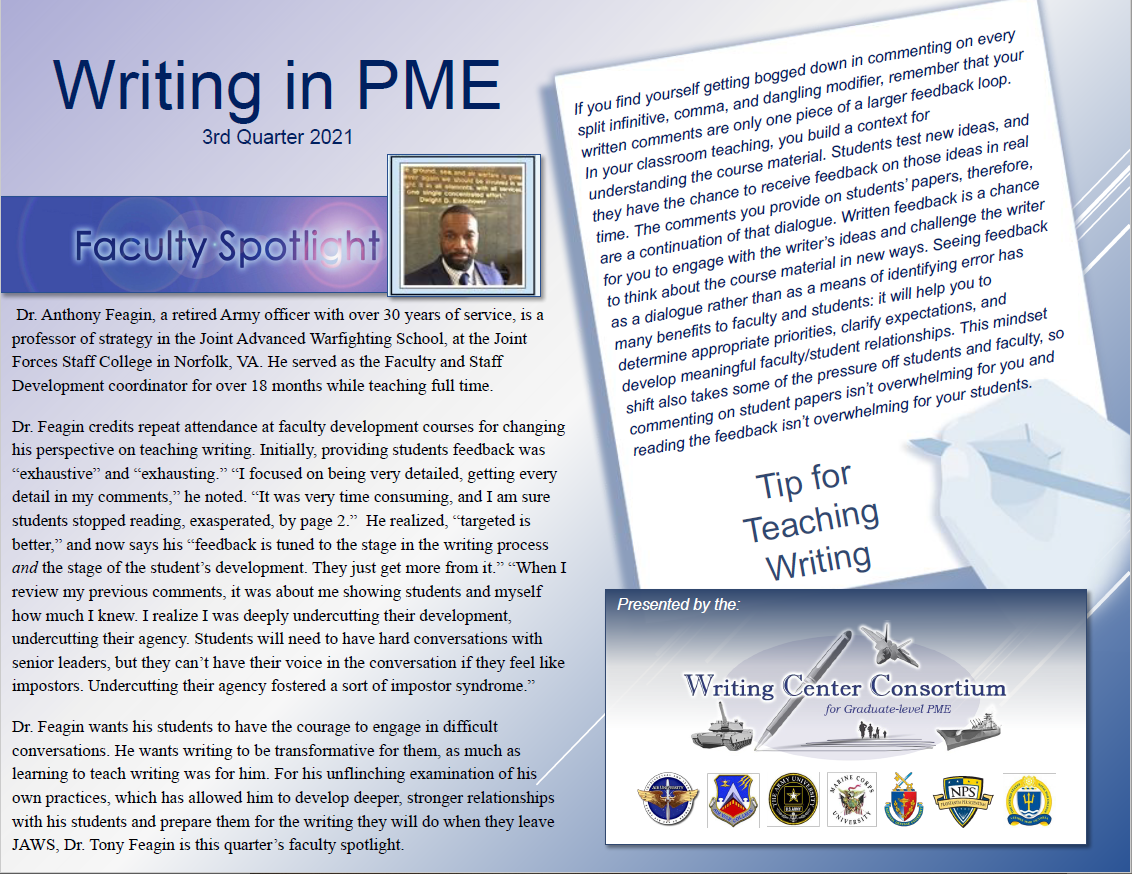Newsletter - Writing Center Consortium for Graduate-level Professional Military Education
Read our latest newsletter:
September 1, 2021
Faculty Spotlight
Dr. Anthony Feagin, a retired Army officer with over 30 years of service, is a professor of strategy in the Joint Advanced Warfighting School, at the Joint Forces Staff College in Norfolk, VA. He served as the Faculty and Staff Development coordinator for over 18 months while teaching full time.
Dr. Feagin credits repeat attendance at faculty development courses for changing his perspective on teaching writing. Initially, providing students feedback was “exhaustive” and “exhausting.” “I focused on being very detailed, getting every detail in my comments,” he noted. “It was very time consuming, and I am sure students stopped reading, exasperated, by page 2.” He realized, “targeted is better,” and now says his “feedback is tuned to the stage in the writing process and the stage of the student’s development. They just get more from it.” “When I review my previous comments, it was about me showing students and myself how much I knew. I realize I was deeply undercutting their development, undercutting their agency. Students will need to have hard conversations with senior leaders, but they can’t have their voice in the conversation if they feel like impostors. Undercutting their agency fostered a sort of impostor syndrome.”
Dr. Feagin wants his students to have the courage to engage in difficult conversations. He wants writing to be transformative for them, as much as learning to teach writing was for him. For his unflinching examination of his own practices, which has allowed him to develop deeper, stronger relationships with his students and prepare them for the writing they will do when they leave JAWS, Dr. Tony Feagin is this quarter’s faculty spotlight.
Tips for Teaching Writing
If you find yourself getting bogged down in commenting on every split infinitive, comma, and dangling modifier, remember that your written comments are only one piece of a larger feedback loop. In your classroom teaching, you build a context for understanding the course material. Students test new ideas, and they have the chance to receive feedback on those ideas in real time. The comments you provide on students’ papers, therefore, are a continuation of that dialogue. Written feedback is a chance for you to engage with the writer’s ideas and challenge the writer to think about the course material in new ways. Seeing feedback as a dialogue rather than as a means of identifying error has many benefits to faculty and students: it will help you to determine appropriate priorities, clarify expectations, and develop meaningful faculty/student relationships. This mindset shift also takes some of the pressure off students and faculty, so commenting on student papers isn’t overwhelming for you and reading the feedback isn’t overwhelm
Current Issue
Past Issues
- 2020-4 Writing in PME 4th Quarter 2020.pdf
- 2020-3 Writing in PME 3rd Quarter 2020.pdf
- 2020-2 Writing in PME 2nd Quarter 2020.pdf
- 2020-1 Writing in PME 1st Quarter 2020.pdf
- 2019-4 Writing in PME 4th Quarter 2019.pdf
- 2019-3 Writing in PME 3rd Quarter 2019.pdf
- 2021-1 Writing in PME 1st Quarter 2021.pdf
- 2021-3 Writing in PME 3rd Quarter 2021.pdf

